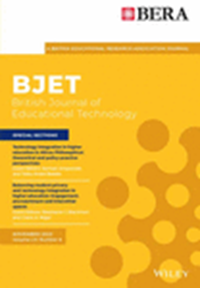在游戏化编程学习中提高计算思维和空间推理能力:有形工具、积木工具和纸笔工具的比较研究
IF 6.7
1区 教育学
Q1 EDUCATION & EDUCATIONAL RESEARCH
引用次数: 0
摘要
有形编程工具因其互动性和增强新手学习者计算思维和空间推理能力的能力,已成为游戏化编程学习(GPL)的主流教学辅助工具。然而,对同时支持这些技能的不同编程工具的相对功效进行比较的研究并不充分。本研究设计并评估了三种编程工具:使用真实可触摸物体的有形编程工具(TPG);使用虚拟编程块和三维游戏场景的积木编程工具(BPG);以及使用纸和笔作画的纸笔编程工具(PPG)。研究涉及三个自然班的 112 名七年级学生:A班(TPG,n1=37)、B班(BPG,n2=38)和C班(PPG,n3=37)。这些学生完成了四项游戏化编程任务,并进行了CT技能、空间推理技能、乐趣、认知负荷和GPL任务清单测量。结果表明,有形编程工具降低了认知负荷,显著提高了空间推理能力以及抽象和问题分解能力。积木式编程工具提供了更愉快的体验,促进了学生的算法设计和效率。纸笔编程工具在提高空间推理能力方面的效果较差。本研究的结果有助于编程教育工作者通过有效选择最合适的编程工具,培养学生的思维能力,改善他们的学习体验。本文章由计算机程序翻译,如有差异,请以英文原文为准。
Enhancing computational thinking and spatial reasoning skills in gamification programming learning: A comparative study of tangible, block and paper‐and‐pencil tools
Tangible programming tools have become a mainstream teaching aid in gamification programming learning (GPL) due to their interactivity and ability to enhance novice learners' computational thinking and spatial reasoning skills. However, comparing the relative efficacy of different programming tools that simultaneously support these skills was not adequately explored. This study designed and evaluated three programming tools: the tangible programming tool (TPG), which uses real touchable objects; the block programming tool (BPG), which employs virtual programming blocks and 3D game scenarios; and the paper‐and‐pencil programming tool (PPG), which uses paper and pen to draw. The study involved 112 seventh‐grade students from three natural classes: Class A (TPG, n1 =37), Class B (BPG, n2 =38), and Class C (PPG, n3 =37). These students completed four gamification programming tasks and CT skills, spatial reasoning skills, enjoyment, cognitive load and GPL task list measurements. The results indicated that the tangible programming tool led to lower cognitive load, significant improvement in spatial reasoning skills and better abstraction and problem decomposition skills. The block programming tool provided a more enjoyable experience and facilitated students' algorithm design and efficiency. The paper‐and‐pencil programming tool was found to be less effective in improving spatial reasoning skills. This study's findings can help programming educators cultivate students' thinking skills and improve their learning experience by effectively selecting the most appropriate programming tools.
求助全文
通过发布文献求助,成功后即可免费获取论文全文。
去求助
来源期刊

British Journal of Educational Technology
EDUCATION & EDUCATIONAL RESEARCH-
CiteScore
15.60
自引率
4.50%
发文量
111
期刊介绍:
BJET is a primary source for academics and professionals in the fields of digital educational and training technology throughout the world. The Journal is published by Wiley on behalf of The British Educational Research Association (BERA). It publishes theoretical perspectives, methodological developments and high quality empirical research that demonstrate whether and how applications of instructional/educational technology systems, networks, tools and resources lead to improvements in formal and non-formal education at all levels, from early years through to higher, technical and vocational education, professional development and corporate training.
 求助内容:
求助内容: 应助结果提醒方式:
应助结果提醒方式:


